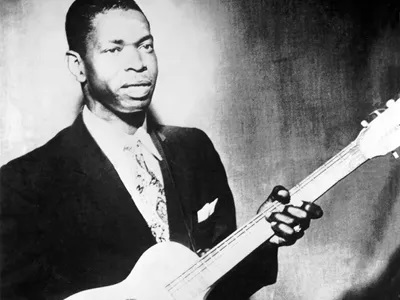Elmore James – A Complete Biography
Introduction
Elmore James (1918–1963) is one of the defining architects of postwar electric blues and a towering figure in slide-guitar playing. Nicknamed the “King of the Slide Guitar,” his urgent vocals and electrified bottleneck style shaped Chicago blues and rippled through early rock—from the Rolling Stones to Eric Clapton—while his signature riff on “Dust My Broom” became one of the most recognizable openings in American popular music.

Childhood
Born Elmore Brooks on January 27, 1918, near Richland in Holmes County, Mississippi, he was raised by sharecropping parents and moved among farms around the Durant area. Like many rural Delta children, he first made music on homemade instruments—including a single strand of broom wire nailed to a porch (the “diddley bow”)—before graduating to guitar.
Youth
By his mid-teens James was playing at local parties; by the late 1930s he was working the Delta’s juke-joint circuit around Belzoni. During these years he encountered and was profoundly influenced by Robert Johnson, whose slide-guitar language and repertoire—especially “I Believe I’ll Dust My Broom”—would echo through James’s later work. He also fell into the orbit of harmonica great Sonny Boy Williamson II (Rice Miller), with whom he would later tour and broadcast on live radio.
Adulthood
Drafted into the U.S. Navy during World War II, James served in the Pacific and took part in the invasion of Guam. After his discharge he returned to Mississippi, worked in a radio-repair shop in Canton (knowledge that informed his aggressive, amplified sound), and resumed performing with Williamson and his cousin, guitarist Homesick James. In August 1951, at Trumpet Records in Jackson, he recorded “Dust My Broom,” stepping out from sideman work to cut the career-defining hit. Following its success, he based himself in Chicago, fronting the tight, hard-driving Broomdusters and recording for a string of labels while shuttling between Mississippi and major recording hubs such as Chicago, New Orleans, Los Angeles, and New York.
Major Compositions
“Dust My Broom” (1951). Adapted from Robert Johnson’s “I Believe I’ll Dust My Broom,” James’s electrified version opened with the “world’s most recognizable slide-guitar riff,” typically played in open tuning with octave glides to the 12th fret. It reached the national R&B Top Ten and essentially set the template for countless later versions and rock-era covers.
“The Sky Is Crying” (1959). This slow blues—credited to James and producer Bobby Robinson—showcases his keening voice and mournful, sustained slide phrasing; it became one of the few James sides to chart during his lifetime.
“Shake Your Moneymaker” (1961). A driving, uptempo showcase for the Broomdusters’ bite and James’s percussive slide attack, the track became a blues-rock staple for later bands.
“It Hurts Me Too.” Although earlier associated with Tampa Red, James’s late recording would become a posthumous chart entry in 1965 and one of his most-covered performances, epitomizing his blend of vocal intensity with echo-laden, answering slide lines.
Other enduring titles associated with James include “Done Somebody Wrong,” “Look on Yonder Wall,” “The Sun Is Shining,” “Standing at the Crossroads,” “Hand in Hand,” and “Madison Blues”—a catalog that underscores how he transcended any “one-lick wonder” caricature.
Death
On May 24, 1963, Elmore James died of a heart attack in Chicago at age forty-five. He had been staying at the home of his cousin and fellow bluesman Homesick James; after a Chicago wake, his body was returned to Mississippi for burial at the Newport Missionary Baptist Church cemetery near Durant.
Conclusion
Elmore James helped translate the rural Delta vocabulary into a ferocious, urban electric style—fueling the evolution of Chicago blues and, by extension, rock music. His signature slide tone, heavy amplifier reverberation, and pent-up vocal drive inspired generations of guitarists and singers. Recognition followed: he was elected to the Blues Hall of Fame in 1980 and inducted into the Rock & Roll Hall of Fame in 1992. More than half a century after his death, his recordings still feel immediate—alive with the intensity that turned a Delta moan into a Chicago roar.

Comments are closed